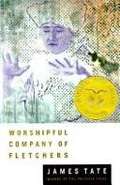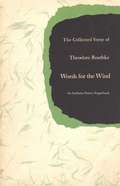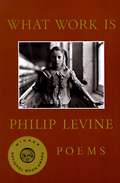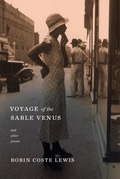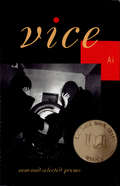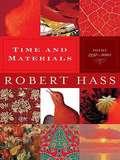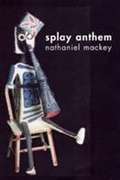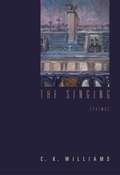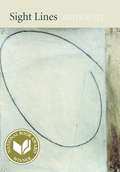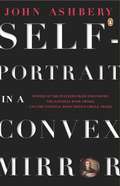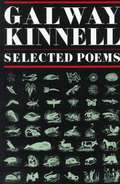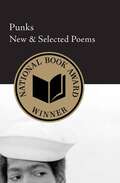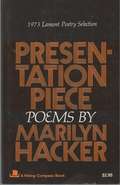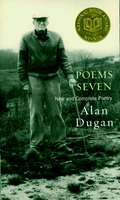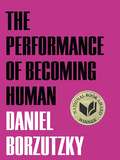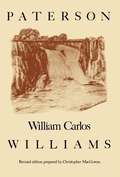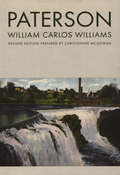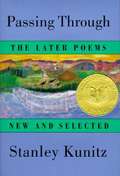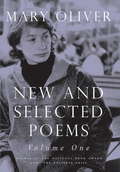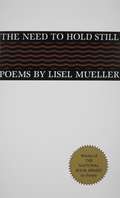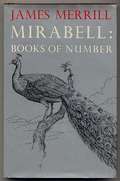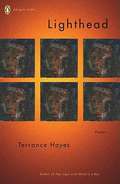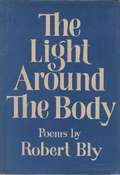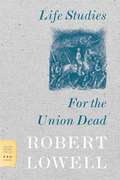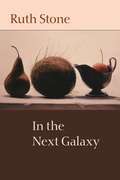Special Collections
National Book Award Winners - Poetry
- Table View
- List View
Worshipful Company of Fletchers
by James TateMasterfully drawing on a variety of voices and characters, James Tate joyfully offers his first book since winning the Pulitzer Prize in 1992 for his "Selected Poems."
Winner of the 1994 National Book Award for poetry.
Words for the Wind
by Theodore RoethkeA collection of the Northwest poet's work up until 1958, which won the National Book Award in 1959. Roethke taught poetry and writing at the University of Washington.
What Work Is
by Philip Levine"This collection amounts to a hymn of praise for all the workers of America. These proletarian heroes, with names like Lonnie, Loo, Sweet Pea, and Packy, work the furnaces, forges, slag heaps, assembly lines, and loading docks at places with unglamorous names like Brass Craft or Feinberg and Breslin's First-Rate Plumbing and Plating. Only Studs Terkel's Working approaches the pathos and beauty of this book. But Levine's characters are also significant for their inner lives, not merely their jobs. They are unusually artistic, living 'at the borders of dreams.' One reads The Tempest 'slowly to himself'; another ponders a diagonal chalk line drawn by his teacher to suggest a triangle, the roof of a barn, or the mysterious separation of 'the dark from the dark.' What Work Is ranks as a major work by a major poet . . . very accessible and utterly American in tone and language." --Daniel L. Guillory, Library Journal
Winner of the National Book Award in 1991
Voyage of the Sable Venus
by Robin Coste LewisA stunning poetry debut: this meditation on the black female figure throughout time introduces us to a brave and penetrating new voice.
Robin Coste Lewis’s electrifying collection is a triptych that begins and ends with lyric poems considering the roles desire and race play in the construction of the self. The central panel is the title poem, “Voyage of the Sable Venus,” a riveting narrative made up entirely of titles of artworks from ancient times to the present—titles that feature or in some way comment on the black female figure in Western art. Bracketed by Lewis’s autobiographical poems, “Voyage” is a tender and shocking study of the fragmentary mysteries of stereotype, as it juxtaposes our names for things with what we actually see and know. Offering a new understanding of biography and the self, this collection questions just where, historically, do ideas about the black female figure truly begin—five hundred years ago, five thousand, or even longer? And what role has art played in this ancient, often heinous story? From the “Young Black Female Carrying / a Perfume Vase” to a “Little Brown Girl / Girl Standing in a Tree / First Day of Voluntary / School Integration,” this poet adores her culture and the beauty to be found within it. Yet she is also a cultural critic alert to the nuances of race and desire and how they define us all, including herself, as she explores her own sometimes painful history. Lewis’s book is a thrilling aesthetic anthem to the complexity of race—a full embrace of its pleasure and horror, in equal parts.
Winner of the National Book Award
Vice
by AiCollected here are poems from Ai's previous five books--Cruelty, Killing Floor, Sin, Fate, and Greed--along with seventeen new poems. Employing her trademark ferocity, these new dramatic monologues continue to mine this award-winning poet's "often brilliant" (Chicago Tribune) vision.
Winner of the National Book Award
Time and Materials
by Robert HassThe poems in Robert Hass's new collection-his first to appear in a decade-are grounded in the beauty and energy of the physical world, and in the bafflement of the present moment in American culture. This work is breathtakingly immediate, stylistically varied, redemptive, and wise.
His familiar landscapes are here—San Francisco, the Northern California coast, the Sierra high country—in addition to some of his oft-explored themes: art; the natural world; the nature of desire; the violence of history; the power and limits of language; and, as in his other books, domestic life and the conversation between men and women. New themes emerge as well, perhaps: the essence of memory and of time.
The works here look at paintings, at Gerhard Richter as well as Vermeer, and pay tribute to his particular literary masters, friend Czeslaw Milosz, the great Swedish poet Tomas Tranströmer, Horace, Whitman, Stevens, Nietszche, and Lucretius. We are offered glimpses of a surprisingly green and vibrant twenty-first-century Berlin; of the demilitarized zone between the Koreas; of a Bangkok night, a Mexican desert, and an early summer morning in Paris, all brought into a vivid present and with a passionate meditation on what it is and has been to be alive. "It has always been Mr. Hass's aim," the New York Times Book Review wrote, "to get the whole man, head and heart and hands and everything else, into his poetry."
Winner of the 2007 National Book Award for Poetry, and the 2008 Pulitzer Prize for Poetry.
Splay Anthem
by Nathaniel MackeyIn a stunning new collection of poems of transport and transcendence, African-American poet Nathaniel Mackey's "asthmatic song of aspiration" scuttles across cultures and histories from America to Andalucía, from Ethiopia to Vienna in a sexy, beautiful adaptive dance. Part antiphonal rant, part rhythmic whisper, Nathaniel Mackey's new collection of poems, Splay Anthem, takes the reader to uncharted poetic spaces. Divided into three sections "Braid," "Fray," and "Nub" (one referent Mackey notes in his stellar Introduction: "the imperial, flailing republic of Nub the United States has become, the shrunken place the earth has become, planet Nub") Splay Anthem weaves together two ongoing serial poems Mackey has been writing for over twenty years. In the cosmology of the Dogon of West Africa, the Andoumboulou are progenitor spirits, and the song of the Andoumboulou is a song addressed to the spirits, a funeral song, a song of rebirth. "Mu," too, splays with meaning: muni bird, Greek muthos, a Sun Ra tune, a continent once thought to have existed in the Pacific. With the vibrancy of a Miró painting, Mackey's poems trace the lost tribe of "we" through waking and dream time, through a multitude of geographies, cultures, histories, and musical traditions, as poetry here serves as the intersection of everything, myth's music, spirit lift.
Winner of the National Book Award
The Singing
by C. K. WilliamsNew work from the Pulitzer Prize winning author of Repair.
Reality has put itself so solidly before me there's little need for mystery. Except for us, for how we take the world to us, and make it more, more than we are, more even than itself. --from "The World"
In his first volume since Repair, C. K. Williams treats the characteristic subjects of a poet's maturity--the loss of friends, the love of grandchildren, the receding memories of childhood, the baffling illogic of current events--with an intensity and drive that recall not only his recent work but also his early books, published forty years ago. He gazes at a Rembrandt self-portrait, and from it fashions a self-portrait of his own. He ponders an "anatomical effigy" at the Museum of Mankind, an in so doing "dissects" our common humanity. Stoking a fire at a house in the country, he recalls a friend who was burned horribly in war, and then turns, with eloquence and authority, to contemporary life during wartime, asking "how those with power over us can effect these things, by what cynical reasoning do they pardon themselves." The Singing is a direct and resonant book: touching, searching, heartfelt, permanent.
The Singing is the winner of the 2003 National Book Award for Poetry.
Sightlines
by Arthur SzeFinalist for the 2019 National Book AwardFrom the current phenomenon of drawing calligraphy with water in public parks in China to Thomas Jefferson laying out dinosaur bones on the White House floor, from the last sighting of the axolotl to a man who stops building plutonium triggers,Sight Lines moves through space and time and brings the disparate and divergent into stunning and meaningful focus. In this new work, Arthur Sze employs a wide range of voices--from lichen on a ceiling to a man behind on his rent--and his mythic imagination continually evokes how humans are endangering the planet; yet, balancing rigor with passion, he seizes the significant and luminous and transforms these moments into riveting and enduring poetry.
Self-Portrait in a Convex Mirror
by John AshberyA collection of poetry by John Ashbery.
Winner of the National Book Award.
Pulitzer Prize Winner
Selected Poems
by Galway KinnellThe poems include two of Kinnell's most frequently reprinted poems, "Saint Francis and the Sow" and "After Making Love We Hear Footsteps" Kinnell draws for his poetry from experiences living in Vermont and New York, as well as from teaching in France, Australia, Iran, and many colleges and universities in this country. Kinnell is now retired from his position as the director of the Creative Writing Program at New York University.
Winner of the National Book Award
Pulitzer Prize Winner
Punks
by John KeeneA landmark collection of poetry by acclaimed fiction writer, translator, and MacArthur Fellow John Keene, PUNKS: NEW & SELECTED POEMS is a generous treasury in seven sections that spans decades and includes previously unpublished and brand new work. With depth and breadth, PUNKS weaves together historic narratives of loss, lust, and love.
The many voices that emerge in these poems--from historic Black personalities, both familial and famous, to the poet's friends and lovers in gay bars and bedrooms--form a cast of characters capable of addressing desire, oppression, AIDS, and grief through sorrowful songs that "we sing as hard as we live." At home in countless poetic forms, PUNKS reconfirms John Keene as one of the most important voices in contemporary poetry.
"John Keene's PUNKS is utterly brilliant. The range, vision, depth and humanity he brings to the page are as galactic as Banneker's astral wanderings, as crisp as the chordal cutting of a searching horn, as courageous and small as a nose wide open. Keene's masterfully inventive inquiry of self and history is queered, Blackened, and joyously thick with multitudes of voice and valence. Amen to this exploration!"--Tyehimba Jess
Poetry. African & African American Studies. LGBTQIA Studies.
Presentation Piece
by Marilyn HackerA collection of surreal poetry, arranged in five parts.
Winner of the National Book Award
Poems Seven
by Alan Dugan and Carl PhillipsPoems Seven: New and Complete Poetry, the winner of the National Book Award, presents the life work of a giant of American letters, tracks a forty-year career of honest, tough artistry, and shows a man at nearly 80 years of age and still at the height of his poetic power. Dugan's new poems continue his career-long concerns with renewed vigor: the poet's insistence that art is a grounded practice threatened by pretension, the wry wit, the jibes at the academic and sententious, and the arresting observations on the quotidian battles of life. All the while he peppers his poems with humorous images of the grim and daunting topics of existential emptiness.
The Performance Of Becoming Human
by Daniel BorzutzkyFollowing in the path of his acclaimed collections THE BOOK OF INTERFERING BODIES (Nightboat, 2011) and IN THE MURMURS OF THE ROTTEN CARCASS ECONOMY (Nightboat, 2015), Daniel Borzutzky returns to confront the various ways nation-states and their bureaucracies absorb and destroy communities and economies.
In THE PERFORMANCE OF BECOMING HUMAN, the bay of Valparaiso merges into the western shore of Lake Michigan, where Borzutzky continues his poetic investigation into the political and economic violence shared by Chicago and Chile, two places integral to his personal formation. To become human is to navigate borders, including the fuzzy borders of institutions, the economies of privatization, overdevelopment, and underdevelopment, under which humans endure state-sanctioned and systemic abuses in cities, villages, deserts.
National Book Award Winner
Paterson
by William Carlos Williams and Christopher J. MacgowanLong recognized as a masterpiece of modern American poetry, William Carlos Williams' "Paterson" is one man's testament and vision. "Paterson" is both a place -- the New Jersey city near which Williams lived -- and a man: the symbolic figure in whom the person (the poet's own life) and the public (the history of the region) are combined.
Winner of the National Book Award
Paterson
by William Carlos Williams and Christopher MacgowanLong recognized as a masterpiece of modern American poetry, WIlliam Carlos Williams' Paterson is one man's testament and vision, "a humanist manifesto enacted in five books, a grammar to help us life" (Denis Donoghue). Paterson is both a place--the New Jersey city in whom the person (the poet's own life) and the public (the history of the region) are combined. Originally four books (published individually between 1946 and 1951), the structure ofPaterson (in Dr. Williams' words) "follows the course of the Passaic River" from above the great falls to its entrance into the sea. The unexpected Book Five, published in 1958, affirms the triumphant life of the imagination, in spite of age and death. This revised edition has been meticulously re-edited by Christopher MacGowan, who has supplied a wealth of notes and explanatory material.
Passing Through
by Stanley KunitzStanley Kunitz, one of the masters of contemporary poetry, presents his ninth collection, gathering a rich selection of his work, including new poems that remind us of his prefatory statement: "Art is the chalice into which we pour the wine of transcendence." Nearly all the poems of Kunitz's later years, beginning with The Testing-Tree (1971), are included, and most of the poems in Passing Through are unavailable in any other edition.
In "Touch Me," the last poem in the collection, Kunitz propounds a question, "What makes the engine go?" and gives us his answer: "Desire, desire, desire." These poems fairly hum with the energy, the excitement, the ardor, that make Kunitz one of our most enduring and highly honored poets. In the words of Carolyn Forché, "he is a living treasure."
Winner of the National Book Award
New and Selected Poems, Volume One
by Mary OliverWhen New and Selected Poems, Volume One was originally published in 1992, Mary Oliver was awarded the National Book Award. In the fourteen years since its initial appearance it has become one of the best-selling volumes of poetry in the country. This collection features thirty poems published only in this volume as well as selections from the poet's first eight books.
Mary Oliver's perceptive, brilliantly crafted poems about the natural landscape and the fundamental questions of life and death have won high praise from critics and readers alike. "Do you love this world?" she interrupts a poem about peonies to ask the reader. "Do you cherish your humble and silky life?" She makes us see the extraordinary in our everyday lives, how something as common as light can be "an invitation/to happiness,/and that happiness,/when it's done right,/is a kind of holiness,/palpable and redemptive." She illuminates how a near miss with an alligator can be the catalyst for seeing the world "as if for the second time/the way it really is." Oliver's passionate demonstrations of delight are powerful reminders of the bond between every individual, all living things, and the natural world.
Winner of the National Book Award
Lighthead
by Terrance HayesWinner of the 2010 National Book Award for Poetry
In his fourth collection, Terrance Hayes investigates how we construct experience. With one foot firmly grounded in the everyday and the other hovering in the air, his poems braid dream and reality into a poetry that is both dark and buoyant. Cultural icons as diverse as Fela Kuti, Harriet Tubman, and Wallace Stevens appear with meditations on desire and history. We see Hayes testing the line between story and song in a series of stunning poems inspired by the Pecha Kucha, a Japanese presentation format. This innovative collection presents the light- headedness of a mind trying to pull against gravity and time. Fueled by an imagination that enlightens, delights, and ignites, Lighthead leaves us illuminated and scorched.
Life Studies and For the Union Dead
by Robert LowellThe title poem of For the Union Dead concerns the death of the Civil War hero (and Lowell ancestor) Robert Gould Shaw, but it also largely centers on the contrast between Boston's idealistic past and its debased present at the time of its writing, in the early 1960's. Throughout, Lowell addresses contemporaneous subjects in a voice and style that themselves push beyond the accepted forms and constraints of the time.
Winner of the National Book Award
In the Next Galaxy
by Ruth StoneRuth Stone writes with crackling intelligence from the vantage point of an aging and impoverished woman. Wise, sardonic, crafty, and misleadingly simple, Stone loves heavy themes but loathes heavy poems.
Winner of the National Book Award
